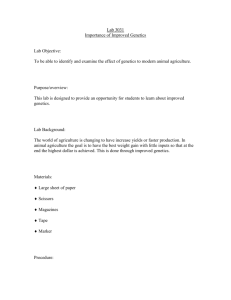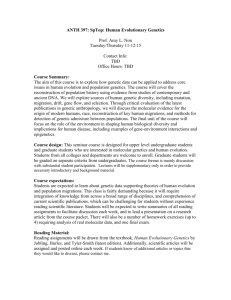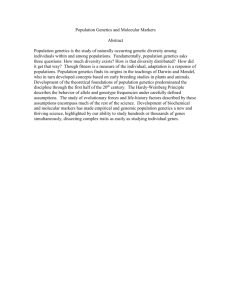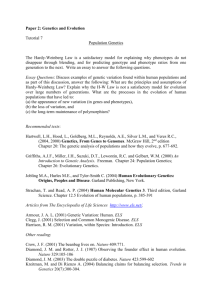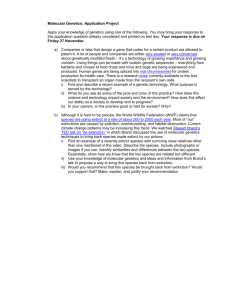Syllabus - FIU Global Learning
advertisement
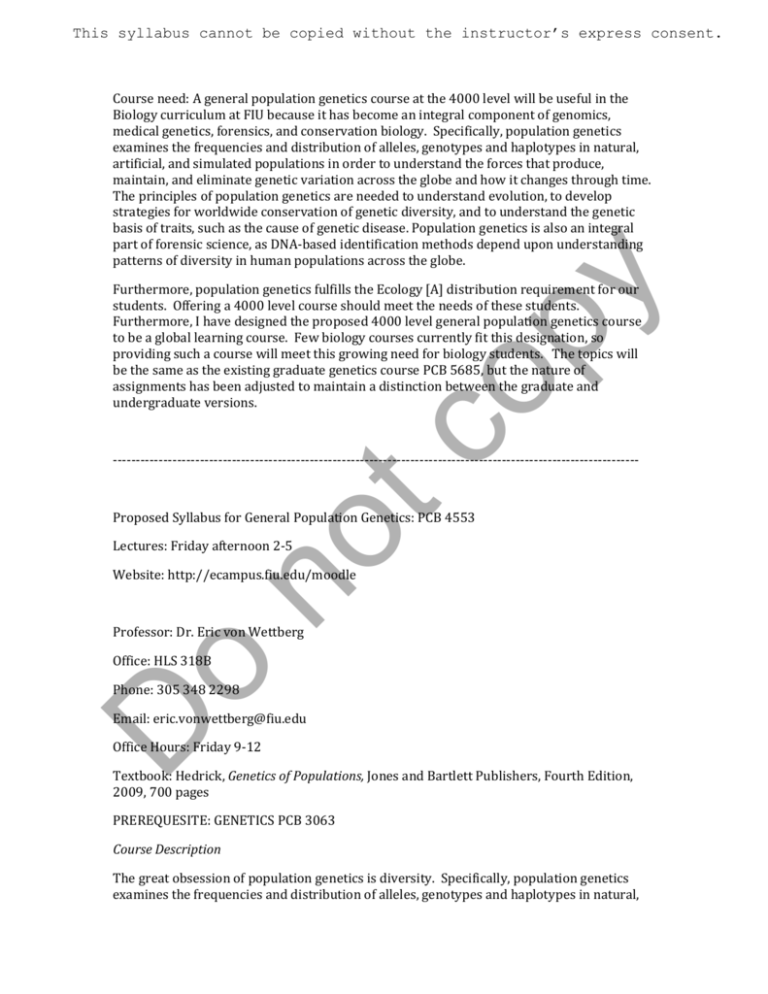
This syllabus cannot be copied without the instructor’s express consent. y Course need: A general population genetics course at the 4000 level will be useful in the Biology curriculum at FIU because it has become an integral component of genomics, medical genetics, forensics, and conservation biology. Specifically, population genetics examines the frequencies and distribution of alleles, genotypes and haplotypes in natural, artificial, and simulated populations in order to understand the forces that produce, maintain, and eliminate genetic variation across the globe and how it changes through time. The principles of population genetics are needed to understand evolution, to develop strategies for worldwide conservation of genetic diversity, and to understand the genetic basis of traits, such as the cause of genetic disease. Population genetics is also an integral part of forensic science, as DNA-based identification methods depend upon understanding patterns of diversity in human populations across the globe. tc op Furthermore, population genetics fulfills the Ecology [A] distribution requirement for our students. Offering a 4000 level course should meet the needs of these students. Furthermore, I have designed the proposed 4000 level general population genetics course to be a global learning course. Few biology courses currently fit this designation, so providing such a course will meet this growing need for biology students. The topics will be the same as the existing graduate genetics course PCB 5685, but the nature of assignments has been adjusted to maintain a distinction between the graduate and undergraduate versions. ------------------------------------------------------------------------------------------------------------------- no Proposed Syllabus for General Population Genetics: PCB 4553 Lectures: Friday afternoon 2-5 Website: http://ecampus.fiu.edu/moodle Professor: Dr. Eric von Wettberg o Office: HLS 318B Phone: 305 348 2298 D Email: eric.vonwettberg@fiu.edu Office Hours: Friday 9-12 Textbook: Hedrick, Genetics of Populations, Jones and Bartlett Publishers, Fourth Edition, 2009, 700 pages PREREQUESITE: GENETICS PCB 3063 Course Description The great obsession of population genetics is diversity. Specifically, population genetics examines the frequencies and distribution of alleles, genotypes and haplotypes in natural, artificial, and simulated populations in order to understand the forces that produce, maintain, and eliminate genetic variation across the globe and how it changes through time. Population genetics is a core discipline in evolutionary and conservation biology and in forensic science. The principles of population genetics are needed to understand evolution and to develop strategies for worldwide conservation of genetic diversity. Population genetics is also an integral part of forensic science, as DNA-based identification methods depend upon understanding patterns of diversity in human populations across the globe. Awareness- Students will develop knowledge of interrelatedness of local, global, international, and intercultural issues, trends and systems Perspective: Students will develop the ability to develop a multi-perspective analysis of local, global, international and intercultural problems Engagement: Students will develop willingness to engage in local, global, international, and intercultural problem solving. op y This is a senior-level undergraduate course on population genetics. This course is a global learning course. As a core discipline for much of biology and a critical buttress for forensics, this course inherently has a global perspective. This course has three global learning aims: tc Because science is becoming an increasingly collaborative effort, this course takes a teambased learning approach. Students will be formed into teams of 5-7 students that persist throughout the semester. Class activities will often be done as teams. Course assignments (reading, problem sets) must be completed before class for individuals to participate in team activities. Class will often begin with an assessment to ensure that students are prepared for group activities. As a consequence of this approach, this course also aims to foster team build, management, and collaborative skills. no This course also requires previous completion of Genetics. The course will involve a weekly lecture, weekly problem sets, and readings from the primary literature and a textbook. This course will have an emphasis on applied examples and applications, from forensics and human biology and from evolutionary ecology and conservation biology. This course will be co-taught with PCB 5685, a graduate level population genetics course. o Course Objectives D This course is intended to provide advanced undergraduates with the theoretical background and analytical tools needed to apply population genetic methods in other fields of study, such as forensics and conservation biology. In providing theoretical background and analytical tools, students should also build skills in: · Critical reading of the primary scientific literature · How to read and explain graphs · Analytical tools for problem solving, such as identification of individuals based on DNA samples · Derivation of formulas under questioning · Argument construction and grantsmanship Learning Outcomes After this course, students should be able to: · define and describe theoretical and historical foundations of population genetics; y · identify, describe, distinguish, compare and analyze mechanisms and fundamental factors (mutation, genetic drift, selection, migration, and mating systems) and their interactions that create diversification within and between populations and affect the genetic structure of populations; op · use empirical methods and tools to describe levels and patterns of genetic diversity and differentiation in populations and to infer and assess population genetic structure; · apply population genetic principles in DNA forensics, conservation genetics (including human impacts on genetics of natural populations), molecular ecology, genetic improvement programs, and evolutionary studies; and Global Learning Outcomes: tc · critically engage with debates about the roles of genetics in human society. Awareness: Students will be able to articulate how broad, interrelated patterns of human global genetic variation affect how we use DNA variation for identification of individuals. no Perspective: Students will be able to compare and contrast how different DNA technologies can affect identification of individuals based on forensic evidence. o Engagement: Students will be able to reflect before and after the course about how it impacts their future practice in terms of their ability to give expert testimony and do research in population genetics. Students are also expected to be aware of some of the challenges new technologies can pose for cultural traditions and social institutions. Assessment 40% Wiki contributions 40% Courtroom Activity 20% D Problem Sets (10) Problems Sets. Population genetics involves a fair amount of simple mathematics, and like math, cannot be learned without working through examples. As a consequence, problems sets are absolutely essential to this course. Not all students excel at problem sets when they do them alone. As a consequence, this course takes a team based learning approach to problem sets. Problem sets will be assigned for the following week’s class meeting at the end of class. Students will work on problem sets alone for the following week, turning in their individual work at the beginning of the following class. This work is expected to be the individual’s own work, following the plagiarism guidelines of this course (see below). Students are expected to show how they derived answers, and credit will be taken away for correct answers that do not show how they were derived. The individual effort will count for half of the grade on the problem set. Students will then work with their team on extensions of the problems in class, hashing out the answers to the problem extensions as a group. Of the 10 problem sets, I will drop the lowest score. op y Wiki contributions: Most weeks there will be a short (~2-4 paragraph) wiki assignment. These will alternate between reviewing papers from the primary literature, commenting on the posts of others, and defining key terms. Such assignments are critical to developing specific writing skills. The wiki is available as part of the Moodle site. tc Courtroom Activity: To emphasize the applied aspects of population genetics, we will engage in mock trials to demonstrate our ability to apply population genetic concepts and approaches to real-world problems. Expectations of students will vary depending on their career stage. Details of the “case” will be provided to students ahead of time. The case studies are picked from international examples, to highlight how genetic process can be understood in other legal and and cultural contexts. no Forensic graduate students from PCB 5685 will give oral testimony as an expert witness. Specific questioning will depend on the nature of the student’s testimony. Undergraduates will serve as the jury and cross-questioners, with extensive evaluation duties. Evaluation of that testimony will composed of 75% evaluation by the instructor, and 25% feedback from peer jury members. o Undergraduate students will serve as jury members for the forensic students, and judges for the biological science students. But they will be an active jury, expected to ask questions of the expert witnesses in addition to evaluating testimony. They will be provided with a rubic to evaluate the quality of the testimony of the expert witness. Each undergraduate student will write extensive evaluations based on the testimony and rubric. The quality of the feedback will be evaluated as the undergraduate student’s grade. D A note about my philosophy towards grades: I believe that grades in university courses, and particularly graduate courses, are as much a reflection on how well I am teaching material as how well you are learning the material. I use grades to adjust the methods I use to present concepts and approaches, to alter the tempo of course activities, or to make other adjustments. Consequently, the regular work of this course is one of my methods for assessing your experience. I will be open to feedback on how well problem sets work, particularly as this is the first time I have taught this course at FIU. This is a course at the advanced undergraduate level. Senior undergraduate students generally have well articulated career goals that their coursework should advance, such as finding jobs in law enforcement, academia, government, the non-profit sector, or industry. Traditionally population genetics has focused on individual completion of problem sets and exams, based on lectures and readings. I have taken extensive steps to change this focus, to make this course directly applicable to real needs of advanced undergraduate students. Assessment in this course is intended to reflect that, by shifting the emphasis towards teambased course work, writing, and oral argumentation. Readings y Most weeks we have a topic, which we will cover with an example from the primary literature, a review paper on the topic, and a reading from the textbook. Hedrick’s textbook is widely used in population genetics. Course Schedule and Content tc op Each week primary literature will be assigned in the previous week’s classes. A large number of papers from the primary literature have been uploaded onto the course website. Among these 1-2 will be chosen, with a week’s notice, as the paper to be a focal point of class. These papers may be reviews of important topics, new methodological or data advances, or classic papers detailing the invention of a method. Many of these papers have international examples, that focus on particular human groups, plants or animals from different parts of the world, or different historical traditions. Date Aug 27 no [Dates approximate for next fall’s schedule. Primary literature cannot be chosen ahead of time to make sure it is current. Last year’s reading available upon request] Topic Text reading Intro & Background Chapter 1 Mendelian and molecular genetics Sep 3 Hardy Weinberg Chapter 2 o Statistics Selection Chapter 3 D Sep 10 Sep 17 Genetic Drift Chapter 4 Population Size Sep 24 Mutation Oct 1 Neutral Theory Chapter 5 Chapter 6 Coalescence Oct 8 Population Subdivision Chapter 7 Gene Flow Oct 15 Inbreeding Chapter 8 Oct 22 Linkage Disequlibrium Chapter 9 Last date to drop course *peer reviews due Quantitative Genetics Special Readings Nov 5 Human Population Genetics y Oct 29 Association Mapping Conservation Genetics Nov 19 Forensics Nov 26 (Thanksgiving) Dec 3 Court room activities Dec 10: Final exam block: More Courtroom activities tc no Course policies op Nov 12 Attendance: This course utilizes team-based learning. Students will form 5-7 member teams that persist throughout the semester. Absences are most disruptive to your team. D o If absences are expected for legitimate reasons (university sponsored travel, etc), please notify both Dr von Wettberg and your team members as far in advance as possible, preferably at least one week in advance. Your team members are the easiest source of information on missed material. As class activities and lectures, along with problem sets, depend on timely completion, advanced notice is required to schedule make-up assignments for students. Late policy: This course utilizes team-based learning. As a consequence, late completion of course work most seriously impacts your peers. Late work also affects my ability to return work to you in a timely fashion, which is one of the main avenues through which I can judge the extent to which you are grasping the material. Consequently, late work impacts my ability to adjust the teaching of this course to suit your needs, and ultimately negatively impacts your experience. Weekly problem sets that are turned in late will result in 50% loss of credit for the personal portion of one’s score, as the problems will be returned to as group work in the class where they are due. Expectations about plagiarism y The internet has made plagiarism an increasingly serious problem, in academia and more generally. Students in this course, as in all FIU courses, are expected to do their own work, and not claim the work of others as their own. Students will adhere to the FIU code of conduct on plagiarism. op Wiki writing: Students will turn in their wiki writings as electronic copies. I reserve the right to submit them to Turn-it-in or other sources, although I do not like to do this as a regular practice. I expect students to adhere to high standards of scientific citations. Students will not cut and paste the words of others. Ideas will be attributed with citations. Citations of ideas are expected to be accurate and meaningful. tc Problem sets: students are expected to do the sets on their own at first. This is to cultivate student’s capacity to do this. Students are expected to show all of their work. Points will be deducted for failure to show one’s work. D o no Group work that follows the individual solutions to problems is intended to correct work, and give students deeper insight into the problems.



